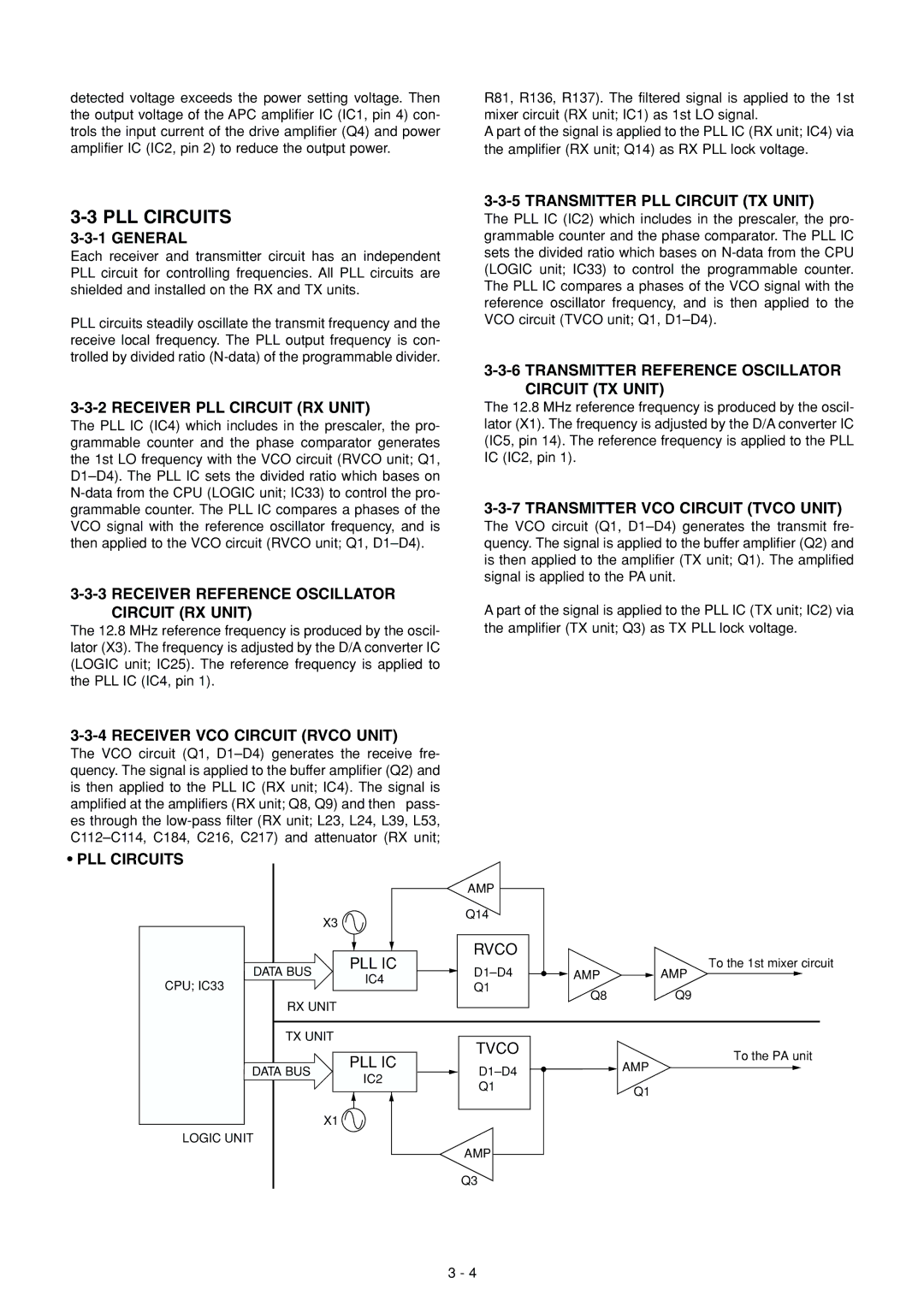
detected voltage exceeds the power setting voltage. Then the output voltage of the APC amplifier IC (IC1, pin 4) con- trols the input current of the drive amplifier (Q4) and power amplifier IC (IC2, pin 2) to reduce the output power.
R81, R136, R137). The filtered signal is applied to the 1st mixer circuit (RX unit; IC1) as 1st LO signal.
A part of the signal is applied to the PLL IC (RX unit; IC4) via the amplifier (RX unit; Q14) as RX PLL lock voltage.
3-3 PLL CIRCUITS
3-3-1 GENERAL
Each receiver and transmitter circuit has an independent PLL circuit for controlling frequencies. All PLL circuits are shielded and installed on the RX and TX units.
PLL circuits steadily oscillate the transmit frequency and the receive local frequency. The PLL output frequency is con- trolled by divided ratio
3-3-2 RECEIVER PLL CIRCUIT (RX UNIT)
The PLL IC (IC4) which includes in the prescaler, the pro- grammable counter and the phase comparator generates the 1st LO frequency with the VCO circuit (RVCO unit; Q1,
3-3-3 RECEIVER REFERENCE OSCILLATOR CIRCUIT (RX UNIT)
The 12.8 MHz reference frequency is produced by the oscil- lator (X3). The frequency is adjusted by the D/A converter IC (LOGIC unit; IC25). The reference frequency is applied to the PLL IC (IC4, pin 1).
3-3-5 TRANSMITTER PLL CIRCUIT (TX UNIT)
The PLL IC (IC2) which includes in the prescaler, the pro- grammable counter and the phase comparator. The PLL IC sets the divided ratio which bases on
3-3-6 TRANSMITTER REFERENCE OSCILLATOR CIRCUIT (TX UNIT)
The 12.8 MHz reference frequency is produced by the oscil- lator (X1). The frequency is adjusted by the D/A converter IC (IC5, pin 14). The reference frequency is applied to the PLL IC (IC2, pin 1).
3-3-7 TRANSMITTER VCO CIRCUIT (TVCO UNIT)
The VCO circuit (Q1,
A part of the signal is applied to the PLL IC (TX unit; IC2) via the amplifier (TX unit; Q3) as TX PLL lock voltage.
3-3-4 RECEIVER VCO CIRCUIT (RVCO UNIT)
The VCO circuit (Q1,
• PLL CIRCUITS |
|
|
|
|
|
| AMP |
|
|
X3 |
| Q14 |
|
|
|
|
|
| |
| PLL IC | RVCO |
| To the 1st mixer circuit |
DATA BUS |
| |||
IC4 | AMP | AMP | ||
CPU; IC33 | Q1 |
|
| |
| Q8 | Q9 | ||
RX UNIT |
|
| ||
|
|
|
| |
TX UNIT |
| TVCO |
|
|
| PLL IC |
| To the PA unit | |
|
|
| ||
DATA BUS |
| AMP | ||
IC2 |
|
| ||
| Q1 |
| Q1 | |
|
|
| ||
|
|
|
| |
X1 |
|
|
|
|
LOGIC UNIT |
|
|
|
|
|
| AMP |
|
|
|
| Q3 |
|
|
|
| 3 - 4 |
|
|
